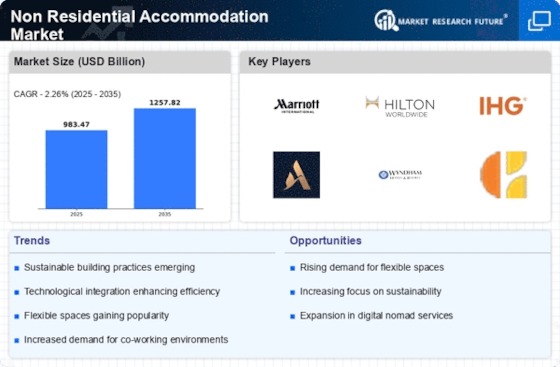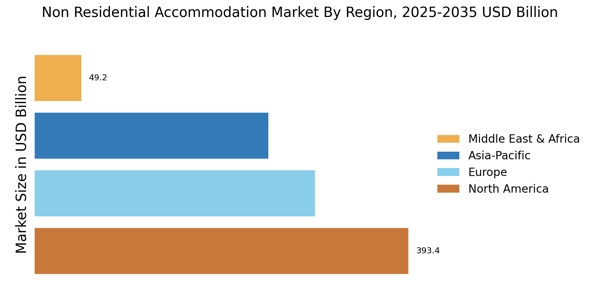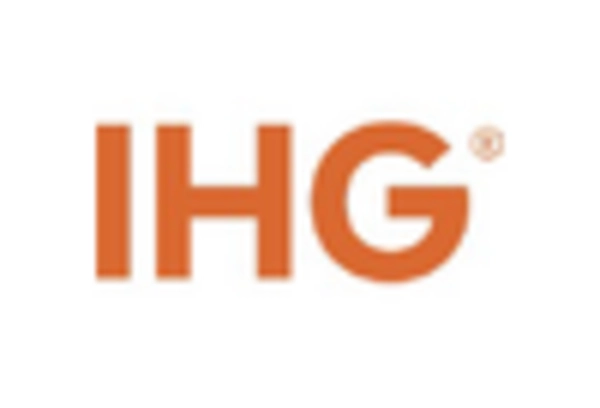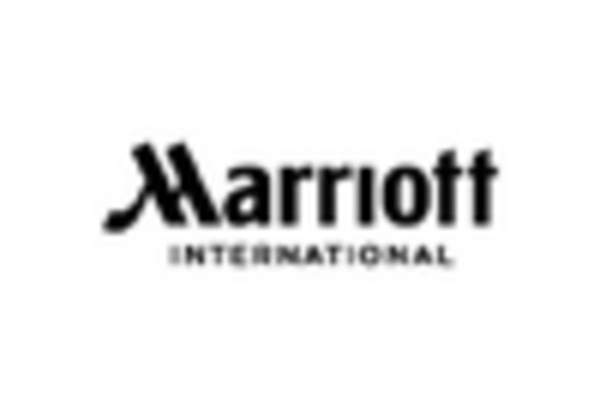Evolving Consumer Preferences
Consumer preferences are shifting, influencing the non residential accommodation Market in notable ways. There is a growing inclination towards mixed-use developments that combine residential, commercial, and recreational spaces. This trend is particularly evident in urban areas where consumers seek convenience and accessibility. Data suggests that mixed-use developments can increase property values by up to 20%, making them an attractive option for investors and developers. Additionally, the rise of experiential retail, where consumers seek unique shopping experiences, is prompting businesses to rethink their spatial requirements. As a result, the Non Residential Accommodation Market must adapt to these evolving preferences, ensuring that new developments align with consumer expectations for integrated and engaging environments.
Government Initiatives and Incentives
Government policies and incentives play a crucial role in shaping the Non Residential Accommodation Market. Various governments are implementing initiatives aimed at stimulating economic growth through infrastructure development and investment in commercial properties. For instance, tax incentives for businesses that invest in non-residential real estate can significantly impact market dynamics. Recent reports indicate that regions with favorable policies have seen a 15% increase in new commercial developments. Furthermore, public-private partnerships are becoming more common, facilitating the construction of essential facilities such as schools, hospitals, and community centers. These initiatives not only enhance the Non Residential Accommodation Market but also contribute to overall economic development and job creation.
Increased Demand for Commercial Spaces
The Non Residential Accommodation Market is currently experiencing a surge in demand for commercial spaces, driven by the expansion of various sectors such as retail, healthcare, and technology. As businesses seek to establish a physical presence, the need for office buildings, retail outlets, and specialized facilities has intensified. According to recent data, the demand for office space is projected to grow by approximately 3% annually, reflecting a robust recovery in business activities. This trend indicates that the Non Residential Accommodation Market is poised for growth, as companies increasingly prioritize location and accessibility to attract customers and talent. Furthermore, urbanization trends contribute to this demand, as more people migrate to urban centers, necessitating the development of new commercial properties to accommodate the growing population.
Technological Advancements in Construction
Technological advancements are revolutionizing the Non Residential Accommodation Market, particularly in construction and design processes. Innovations such as Building Information Modeling (BIM) and modular construction techniques are streamlining project timelines and reducing costs. Data indicates that the adoption of these technologies can decrease construction time by up to 30%, allowing developers to respond more swiftly to market demands. Additionally, smart building technologies are gaining traction, enhancing energy efficiency and occupant comfort. As businesses increasingly prioritize sustainability and operational efficiency, the integration of technology in non-residential properties is likely to become a standard expectation. This shift presents opportunities for the Non Residential Accommodation Market to innovate and meet the evolving needs of tenants and investors.
Sustainability and Green Building Practices
Sustainability is becoming a central focus within the Non Residential Accommodation Market, as stakeholders recognize the importance of environmentally friendly practices. The demand for green buildings, which utilize sustainable materials and energy-efficient systems, is on the rise. Recent studies indicate that properties with green certifications can command rental premiums of 5-10% compared to traditional buildings. This trend is driven by both regulatory pressures and consumer preferences for sustainable options. As businesses aim to enhance their corporate social responsibility profiles, the Non Residential Accommodation Market is likely to see an increase in the development of eco-friendly commercial spaces. This shift not only benefits the environment but also aligns with the financial interests of developers and investors.

















